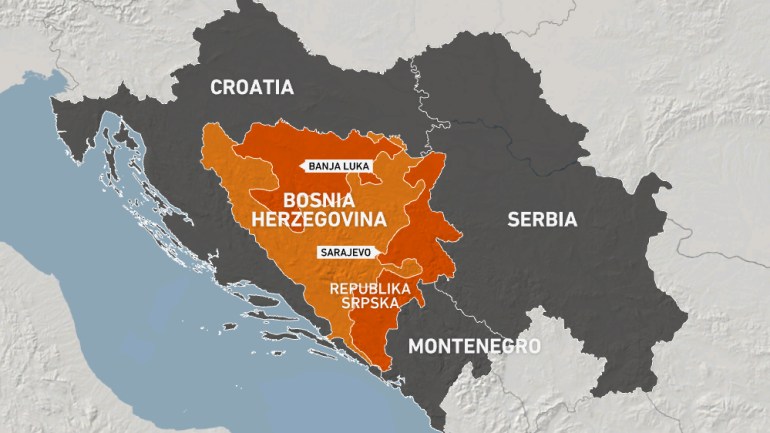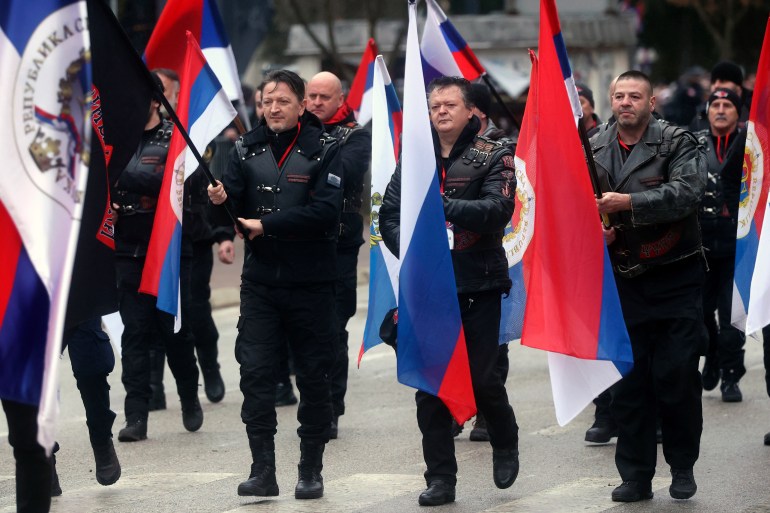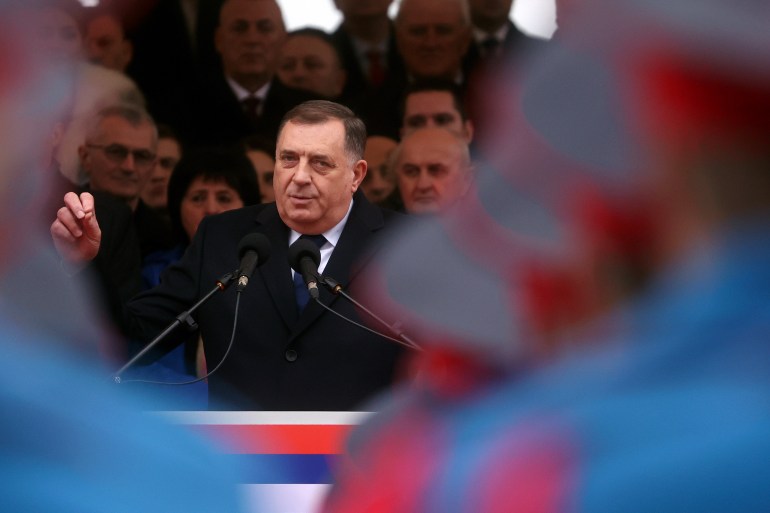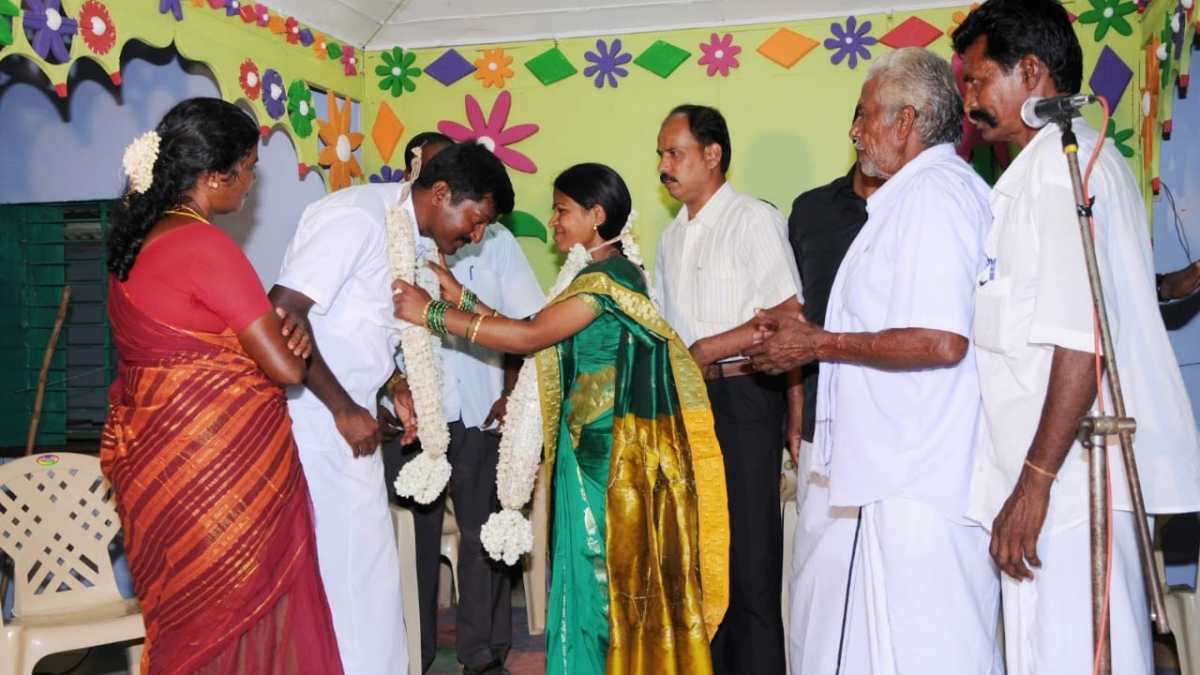World refuses to act on banned Serb secessionist parade: Bosnians | Politics News
As Bosnian Serb police units paraded in East Sarajevo on Monday, marking the outlawed “Republika Srpska Day”, Bosnia and Herzegovina’s capital, a few kilometres away, held an academic event at the national theatre titled “January 9 – the path to genocide”.
Srebrenica genocide survivor Almasa Salihovic, 35, said while those in Bosnia’s Serb-led entity spoke about their pride in Republika Srpska (RS) as their only homeland, other Bosnians remembered their sense of grief on January 9, 1992, a day which for them “marked the path to the bloodiest years of the war”.
“At the forum, we heard messages which almost every year citizens who want a complete Bosnia send – and that is that commemorating January 9 is unconstitutional, it’s a threat to peace, and it’s rubbing salt in the still unhealed wounds of victims,” Salihovic told Al Jazeera.
“If they were celebrating a people, that would be all right. But they are celebrating a day when political leaders under the leadership of [convicted war criminal] Radovan Karadzic consciously decided to set genocidal goals towards certain people of Bosnia. If the Serb public cannot see this, it’s terrifying to think whether these same goals will ensue in the future,” she said.
On Monday, thousands of RS police took part in the parade marking the day, which has been ruled unconstitutional by Bosnia’s Constitutional Court.
The court first banned the event in 2015, stating that it is discriminatory against non-Serbs in the entity which is home to 1.2 million people, but RS authorities have continued to mark the day regardless every year as a public holiday.

On January 9, 1992, the Bosnian Serb assembly issued a declaration proclaiming the region as an independent “Republic of Serb people of Bosnia and Herzegovina”, with the goal of joining self-proclaimed Serb regions in the country with Serbia.
The move set off the war in Bosnia, resulting in 100,000 deaths and a genocide in Srebrenica, as Croat and Serb forces attempted to divide the country into Greater Croatia and Greater Serbia, respectively.
The conflict ended with the US-brokered Dayton Peace Agreement signed in December 1995, which split the country into two semi-autonomous parts – the Serb-majority RS entity, comprising about half the country, and the Federation entity, where most Bosniaks and Croats live.
The Constitutional Court upholds Bosnia’s constitution formed as part of the Dayton accords. As the highest judicial body in the country, it rules over judgements of any other court, including those at the entity level. Last June, it blocked RS from forming its own army at the entity level and other separate Serb institutions, ruling the decisions made by RS’s National Assembly to be invalid.
Political scientist Jasmin Mujanovic said the centring of the police in these marches is a “direct call back” to the Bosnian genocide.
When the entity was a breakaway region, RS police were “the primary organising node for directing the initial hostile takeovers, distribution of arms arriving from Serbia, first killings and expulsions”, he said, writing on social media.
On Monday at the event, which is essentially a military parade, armoured vehicles blocked off the main roads linking the capital, Sarajevo, located in the Federation entity, to East Sarajevo.
Senior officials from the governments of RS and Serbia attended, including separatist Republika Srpska President Milorad Dodik and Serbia’s Foreign Minister Ivica Dacic.
The sons of Serbian President Aleksandar Vucic and convicted war criminal Ratko Mladic were seen among the guests standing near the top leaders.
Sin osuđenog ratnog zločinca Ratka Mladića, Darko Mladić, iz VIP zone je posmatrao defile povodom neustavnog dana RS. Nedaleko od njega bio je i Danilo Vučić, sin aktualnog predsjednika Srbije Aleksandra Vučića. Obilježavanju dana RS je prisustvovao i Ivica Dačić pic.twitter.com/6eCzbcHIkN
— Istraga.ba (@IstragaB) January 9, 2023
For years, Dodik has continued to push for secession. He wants to unite RS with neighbouring Serbia.
“We’re not doing this out of spite, rather to show that we are ready to fight for our freedom,” Radio Free Europe quoted Dodik as saying at the event.

The news outlet reported that the anthems of Republika Srpska and Serbia were played at the parade.
Local members of the US-blacklisted Russian motorcycle club Night Wolves participated in the march; in 2018, they were accused of pushing for a separatist movement among Serbs in the country.
People were also seen raising flags of the Moscow-backed self-proclaimed Donetsk People’s Republic in Ukraine.
A day earlier, in a sign of never-better ties with Russia despite its war in Ukraine, Dodik awarded Putin in absentia with the highest medal of honour for his “patriotic concern” for RS.
Prilikom obilježavanja neustavnog dana RS u Istočnom Sarajevu bila je istaknuta i zastava takozvane Donjecke narodne republike. DNR je paradržava na teritoriji Ukrajine FOTO: RFE pic.twitter.com/mwKIDj9CxB
— Istraga.ba (@IstragaB) January 10, 2023
‘Push the red line further out’
Several Bosnians have slammed the international community, notably the Office of the High Representative, Bosnia’s top body which oversees the Dayton accords, for its apparent indifference.
They say foreign officials should pressure RS authorities to respect the law and cancel the celebrations, or at least speak out on what some call the “orgies of fascism” on show.
Al Jazeera contacted the OHR for a response, and a spokesperson sent this reporter a link to a statement published online last month as well as a tweet posted on Monday, in which the body wrote: “acts and activities of the RS authorities designating and celebrating the RS Day on 9 January may have consequences”.
When asked in an email if there are consequences and what those consequences may be, the OHR said: “We have nothing to add to the statements we have already published.”
Academy Award nominated director Jasmila Zbanic (“Quo Vadis,Aida?”) slams passive indifference of the EU & the international community as a whole to today’s paramilitary march by Serb secessionists, also calling out the feckless @OHR_BiH for tolerating such “orgies of fascism”. pic.twitter.com/TbzywQ8nRP
— Jasmin Mujanović (@JasminMuj) January 9, 2023
Fazila Efendic of the Mothers of Srebrenica association told Al Jazeera that if the international community wanted to react, they would have done so long ago.
In July 1995 in Srebrenica, Serb forces killed half of Efendic’s family – 22 relatives, including her son, husband, uncles, nephews, and cousins.
“The weapons have stopped [shooting], but in another way through words, certain moves, the genocide has been prolonged. With just the Dayton peace agreement, when they divided Bosnia into two entities, that’s proof that [the international community] does not want Bosnia to be a normal country – rather they want to have a training ground for further conflicts,” Efendic said.
She argued that Bosnia as a state – its institutions and bodies – needs stronger powers than its entities.
“When that happens, then a person could have hope for something … it’s a horrible situation that entities exist. For me, [the creation of entities] is the ugliest thing that can happen after the genocide for Bosnia and citizens of Bosnia. Bosnia is small [geographically] anyway,” Efendic said.

Kurt Bassuener, senior associate at the Democratization Policy Council, a German think tank, told Al Jazeera that Dodik and Dragan Covic, leader of the Bosnian Croat nationalist HDZ party, are trying to see who can “push the red line further out” and avoid Western condemnation.
“It’s part of Western posture that we want things to not be a problem for us, we don’t want to spend a great deal of energy on reforming a policy that has been failing for 17 years,” Bassuener said, explaining the international community’s position.
“Everything has been a test run for Dodik and every time he’s been accommodated, he’s pushed the line further and further out … he feels bulletproof. That’s an undeniable factor in his pushiness.”
Placing troops of the European Union Force in Bosnia and Herzegovina (EUFOR), a credible military deterrent on the ground, especially in strategic locations such as Brcko district in the north which divides the two entities, would have been “the best way to deal with Dodik”, he said, but this was not done.
“There is no strategy on anybody’s part,” Bassuener said. “Dodik is the only one who seems to have sort of a strategy … so he’s continuing to advance.”





Pingback: More hints
Pingback: cartel oil co oklahoma
Pingback: รับทำเว็บไซต์ WordPress